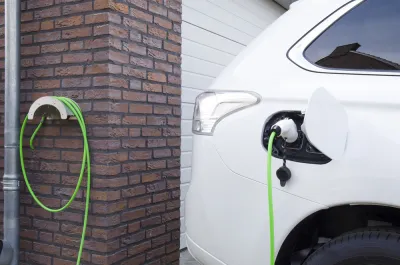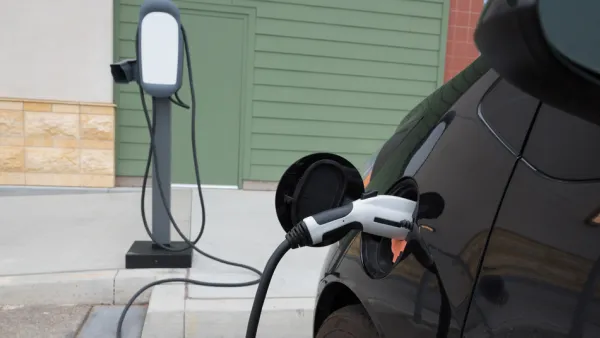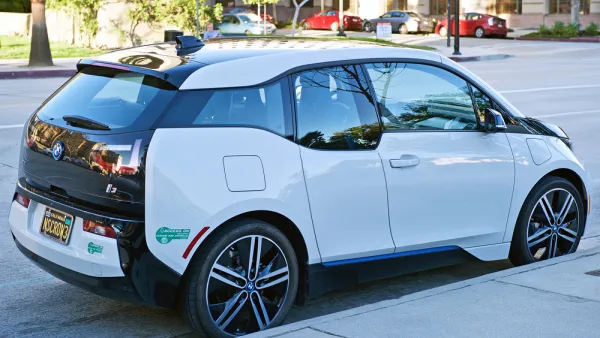Battery electric vehicles (without gas tanks) are eligible for a $2,500 California rebate, on top of the federal $7,500 tax credit. A bill before the state Senate would quadruple it.

[Updated August 29, 2017] California may be the nation's leader in terms of climate mitigation laws and regulations, but it does not look like the state will meet it's new 2030 target that calls for reducing emissions 40 percent by 2030. Two recent studies, one by the California Air Resources Board, the other by the non-profit Next 10, point the finger at the state's auto culture, as emissions are dropping in all other sectors but the largest, transportation.
Notwithstanding a generous financial incentive program and other perks, not enough electric vehicles (EVs) are being purchased by the state's residents, reports Russ Mitchell for the Los Angeles Times.
In 2016, of the just over 2 million cars sold in the state, only 75,000 were pure-electric and plug-in hybrid cars [3.75 percent]. To date, out of 26 million cars and light trucks registered in California, just 315,000 are electric or plug-in hybrids [0.06 percent].
Is the problem that EVs cost too much?
The idea behind Assembly Bill 1184: "Vehicular air pollution, electric vehicles – incentives," by Assemblyman Phil Ting (D-San Francisco), is "to use state rebate money so the consumer needn’t pay more for an electric compact car than a similar gasoline-powered compact car."
That’s the essence of the plan that could lift state rebates from $2,500 to $10,000 or more for a compact electric car, making, for example, a Chevrolet Bolt EV electric car [starting at $37,495] cost the same as a gasoline-driven Honda Civic [starting at $18,740].
That's pretty close. The all-electric Bolt is also eligible (for the time-being) a $7,500 federal Plug-In Electric Drive Vehicle Credit, bringing the cost down to $19,995.
The budget for such a program would be $3 billion, up from the $449 million the state has spent over seven years that the rebate program has existed, and that has created concerns for legislators and state legislative analysts, adds Mitchell.
The bill is opposed by Republicans averse to taxpayer subsidies and even the Legislature’s own analysts have called it “duplicative,” “unclear” and “problematic.
The legislative analysis goes into depth on the source of the funds, the Greenhouse Gas Reduction Fund, consisting of proceeds from the cap-and-trade auction of carbon permits. Last month, legislation to continue cap-and-trade beyond 2020 passed the legislature and was signed by Gov. Jerry Brown.
Or is the problem a lack of charging infrastructure?
A University of California study, also released last month, concluded the major obstacle to widespread adoption of EVs was a lack of charging infrastructure, the topic of a July 6 post: "Charging Anxiety, Not Price Anxiety, the Biggest Impediment to Electric Vehicle Adoption."
AB 1184 is co-sponsored by Advanced Energy Economy, a national association of business leaders working on clean energy, and NextGen America, founded by business leader, philanthropist and political and environmental activist, Tom Steyer.
The bill has passed the Assembly and is before the Senate Appropriations Committee. It needs to pass the legislature by Sept. 15 and be approved by Gov. Jerry Brown to become law.
Hat tip to Julie Bloom, editor of California Today (New York Times).
FULL STORY: Should California spend $3 billion to help people buy electric cars?

Analysis: Cybertruck Fatality Rate Far Exceeds That of Ford Pinto
The Tesla Cybertruck was recalled seven times last year.

National Parks Layoffs Will Cause Communities to Lose Billions
Thousands of essential park workers were laid off this week, just before the busy spring break season.

Retro-silient?: America’s First “Eco-burb,” The Woodlands Turns 50
A master-planned community north of Houston offers lessons on green infrastructure and resilient design, but falls short of its founder’s lofty affordability and walkability goals.

Test News Post 1
This is a summary

Analysis: Cybertruck Fatality Rate Far Exceeds That of Ford Pinto
The Tesla Cybertruck was recalled seven times last year.

Test News Headline 46
Test for the image on the front page.
Urban Design for Planners 1: Software Tools
This six-course series explores essential urban design concepts using open source software and equips planners with the tools they need to participate fully in the urban design process.
Planning for Universal Design
Learn the tools for implementing Universal Design in planning regulations.
EMC Planning Group, Inc.
Planetizen
Planetizen
Mpact (formerly Rail~Volution)
Great Falls Development Authority, Inc.
HUDs Office of Policy Development and Research
NYU Wagner Graduate School of Public Service




























